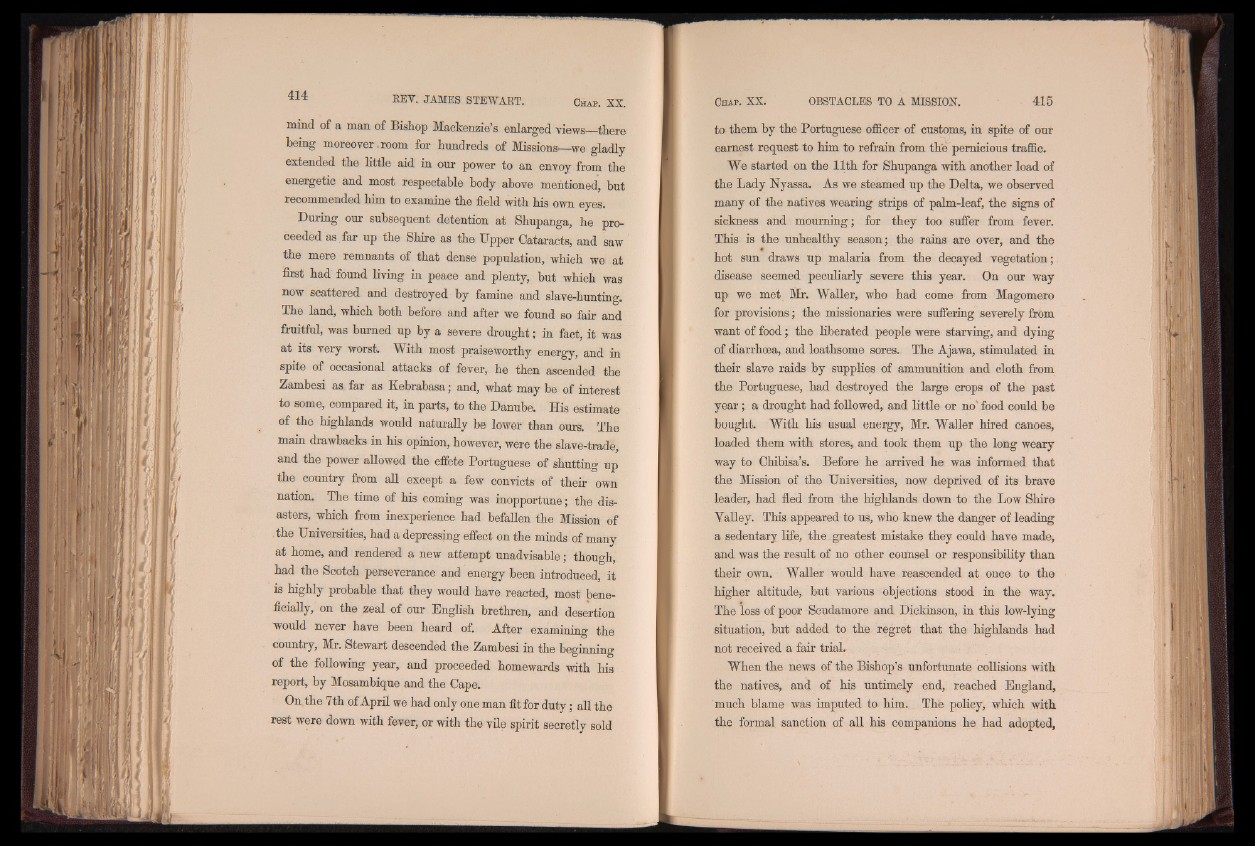
mind of a man of Bishop Mackenzie’s enlarged views there
being moreover .room for hundreds of Missions—we gladly
extended the little aid in our power to an envoy from the
energetic and most respectable body above mentioned, but
recommended him to examine the field with his own eyes.
During our subsequent detention at Shupanga, he proceeded
as far up the Shire as the Upper Cataracts, and saw
the mere remnants cf that dense population, which we at
first had found living in peace and plenty, but which was
now scattered and destroyed by famine and slave-hunting.
The land, which both before and after we found so fair and
fruitful, was burned up by a severe drought | in fact, it was
at its very worst. With most praiseworthy energy, and in
spite of occasional attacks of fever, he then ascended the
Zambesi as far as Eebrabasa; and, what may be of interest
to some, compared it, in parts, to the Danube. His estimate
of the highlands would naturally be lower than ours. The
main drawbacks in his opinion, however, were the slave-trade,
and the power allowed the effete Portuguese of shutting up
the country from all except a few convicts of their own
nation. The time of his coming was inopportune; the disasters,
which from inexperience had befallen the Mission of
the Universities, had a depressing effect on the minds of many
at home, and rendered a new attempt unadvisable; though,
had the Scotch perseverance and energy been introduced, it
is highly probable that they would have reacted, most beneficially,
on the zeal of our English brethren, and desertion
would never have been heard of. After examining the
country, Mr. Stewart descended the Zambesi in the beginning
of the following year, and proceeded homewards with his
report, by Mosambique and the Cape.
On the 7th of April we had only one man fit for duty; all the
rest were down with fever, or with the vile spirit secretly sold
to them by the Portuguese officer of customs, in spite of our
earnest request to him to refrain from the pernicious traffic.
We started on the 11th for Shupanga with another load of
the Lady Nyassa. As we steamed up the Delta, we observed
many of the natives wearing strips of palm-leaf, the signs of
sickness and mourning ; for they too suffer from fever.
This is the unhealthy season; the rains are over, and the
hot sun draws up malaria from the decayed vegetation ;
disease seemed peculiarly severe this year. On our way
up we met Mr. Waller, who had come from Magomero
for provisions ; the missionaries were suffering severely from
want of food ; the liberated people were starving, and dying
of diarrhoea, and loathsome sores. The Ajawa, stimulated in
their slave raids by supplies of ammunition and cloth from
the Portuguese, had destroyed the large crops of the past
year ; a drought had followed, and little or no' food could be
bought. With his usual energy, Mr. Waller hired canoes,
loaded them with stores, and took them up the long weary
way to Chibisa’s. Before he arrived he was informed that
the Mission of the Universities, now deprived of its brave
leader, had fled from the highlands down to the Low Shire
Yalley. This appeared to us, who knew the danger of leading
a sedentary life, the greatest mistake they could have made,
and was the result of no other counsel or responsibility than
their own. Waller would have reascended at once to the
higher altitude, but various objections stood in the way.
The loss of poor Scudamore and Dickinson, in this low-lying
situation, but added to the regret that the highlands had
not received a fair trial.
When the news of the Bishop’s unfortunate collisions with
the natives, and of his untimely end, reached England,
much blame was imputed to him. Thè policy, which with
the formal sanction of all his companions he had adopted,